外研版(2019)必修 第一册 Unit 2 Exploring English Using language(共33张PPT,内嵌视频)
文档属性
| 名称 | 外研版(2019)必修 第一册 Unit 2 Exploring English Using language(共33张PPT,内嵌视频) |  | |
| 格式 | pptx | ||
| 文件大小 | 67.8MB | ||
| 资源类型 | 教案 | ||
| 版本资源 | 外研版(2019) | ||
| 科目 | 英语 | ||
| 更新时间 | 2024-09-14 15:29:53 | ||
图片预览


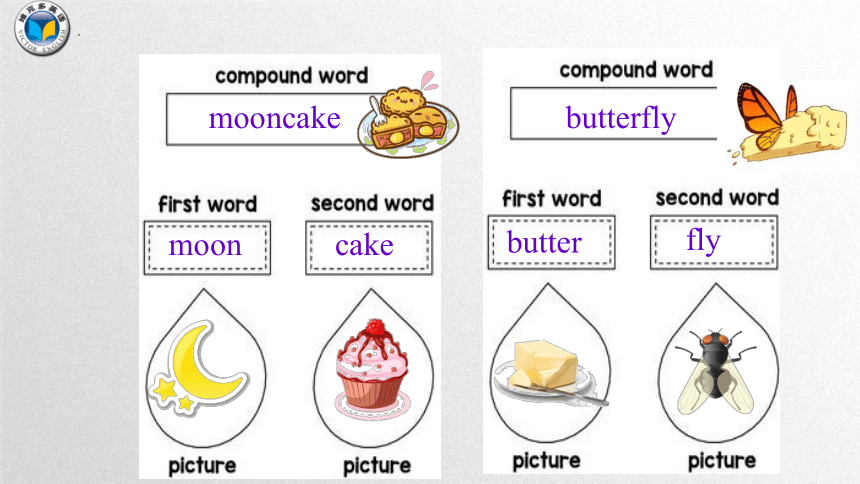

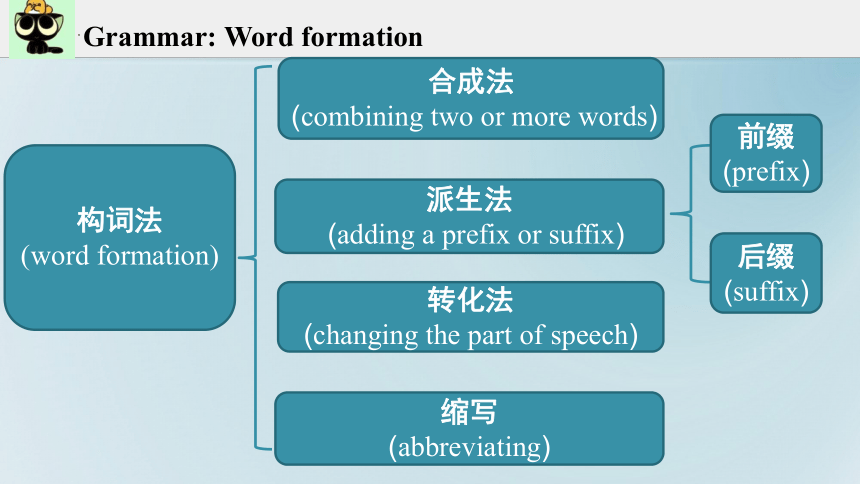
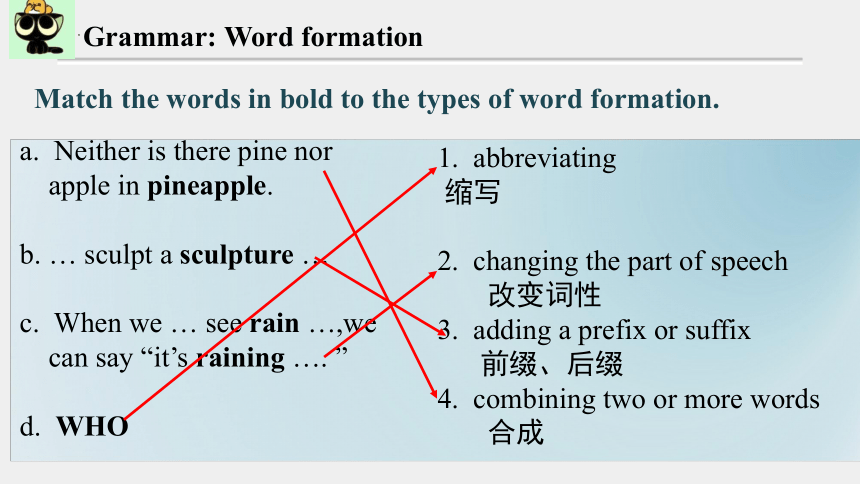
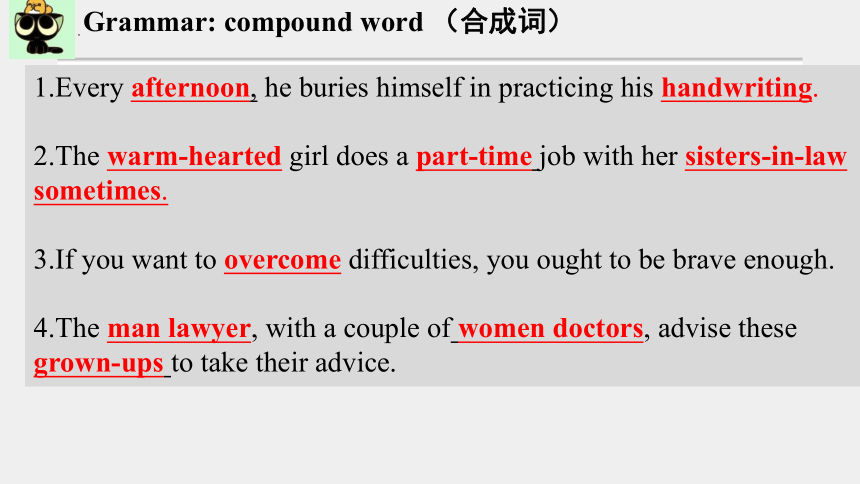
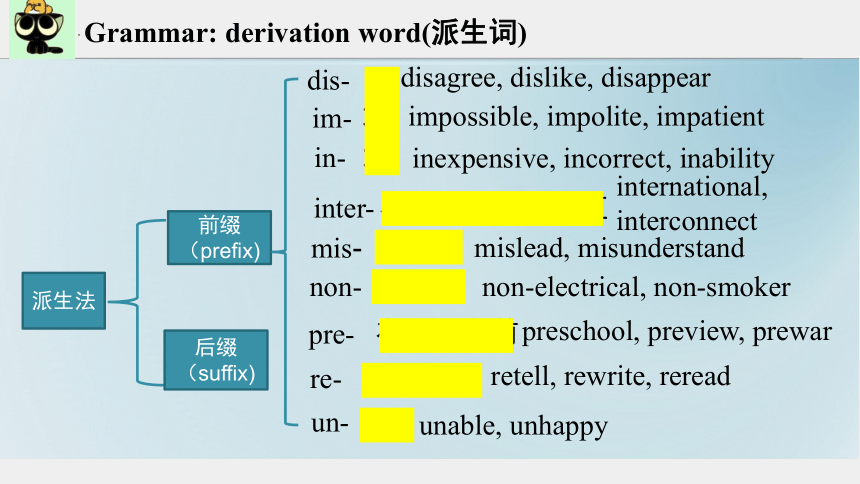


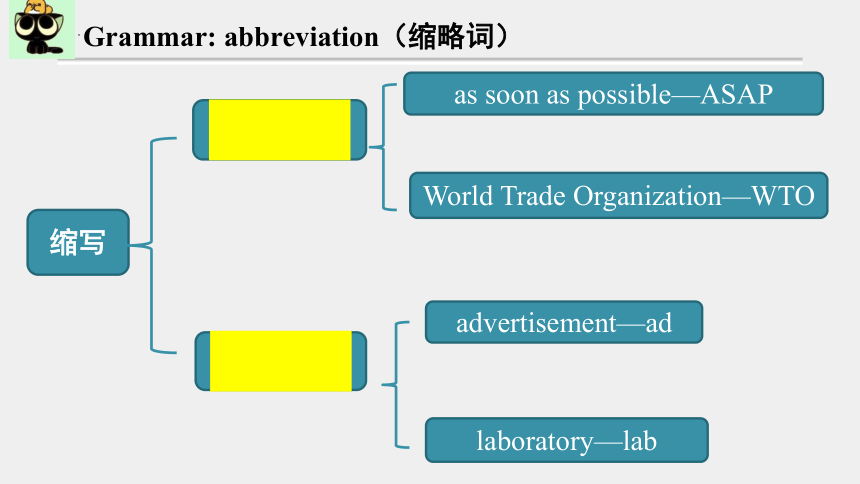

文档简介
(共34张PPT)
Unit 2 Exploring English
Using language
Grammar: Word formation
the importance of learning words
butterfly
butter
fly
mooncake
moon
cake
+
=
+
=
Grammar: Word formation
构词法
(word formation)
合成法
(combining two or more words)
派生法
(adding a prefix or suffix)
转化法
(changing the part of speech)
缩写
(abbreviating)
前缀
(prefix)
后缀
(suffix)
Grammar: Word formation
Match the words in bold to the types of word formation.
a. Neither is there pine nor
apple in pineapple.
b. … sculpt a sculpture …
c. When we … see rain …,we
can say “it’s raining …. ”
d. WHO
1. abbreviating
缩写
2. changing the part of speech
改变词性
3. adding a prefix or suffix
前缀、后缀
4. combining two or more words
合成
Grammar: compound word (合成词)
1.Every afternoon, he buries himself in practicing his handwriting.
2.The warm-hearted girl does a part-time job with her sisters-in-law sometimes.
3.If you want to overcome difficulties, you ought to be brave enough.
4.The man lawyer, with a couple of women doctors, advise these grown-ups to take their advice.
Grammar: derivation word(派生词)
派生法
前缀(prefix)
后缀(suffix)
dis-
im-
in-
disagree, dislike, disappear
impossible, impolite, impatient
inexpensive, incorrect, inability
inter-
mis-
non-
pre-
re-
un-
不
不
不
在……之间;相互
错误地
不,非
在……之前
再,重新
不
international,
interconnect
mislead, misunderstand
non-electrical, non-smoker
preschool, preview, prewar
retell, rewrite, reread
unable, unhappy
Grammar: derivation word(派生词)
派生法
前缀(prefix)
后缀(suffix)
-er, or
-ment
-ship
-tion
-able
-ful
-less
-ous
-ly
(做某事)的人 / ……者
表示动作、状态、结果
表示技能、地位、性质、状态
表示结果
表示有……性质的,可……的
表示有……性质的,充满的
表示无、没有
表示有……特性的
表示方式
dancer, actor
arrangement
development
leadership
friendship
relation, reflection
washable
comfortable
useful
mouthful
careless, useless
dangerous, nervous
carefully, quickly
Grammar: conversion word(转化词)
1. The tramp dreamed a sweet dream.
2. The clean blackboard is cleaned by students.
3. He studied hard and his hard work paid off.
4. You have no right to stop people from doing the right thing.
转化法
动词转化为名词
形容词转化为动词
副词转化为形容词
形容词转化为名词
Grammar: abbreviation(缩略词)
缩写
首字母缩写
单词截短
as soon as possible—ASAP
World Trade Organization—WTO
advertisement—ad
laboratory—lab
Grammar: Word formation
Complete the passage with the help of word formation.
When you open a dictionary, you often come across a lot of unfamiliar words. You might think this is a bit scary. But many of them are formed using other simpler words. This is called word formation.
Words formed by combining other words are called compounds, for example, __________ (a friend that you contact by writing, traditionally using a pen) and __________ (known by many people).
penfriend
well-known
Grammar: Word formation
Complete the passage with the help of word formation.
Prefixes and suffixes often have fixed meanings. If you add un- or in- to a word, the new word usually means the opposite. For example, if something isn’t correct it’s ________, and if someone isn’t happy they are _________. Words with the suffixes -ment and -ness are often nouns. For example, if somebody has improved a lot, they have made great ____________.
incorrect
unhappy
improvement
Grammar: Word formation
Complete the passage with the help of word formation.
Some nouns and adjectives can be used as verbs, or the other way round. When we calm somebody down, they become ______. And we can give someone a present by__________ it.
And sometimes a word is made up of the first letters of several words: “World Trade Organization ” can be referred to as _____ , and ______is short for “as soon as possible”.
It is impossible to know the meaning of every word, but knowing about word formation can help us guess their meanings.
calm
presenting
WTO
ASAP
Grammar: Word formation
Work in groups. Choose one type and come up with as many as words as possible.
abbreviating
changing the part of speech
adding a prefix or suffix
combining two or more words
Group A
Group B
Winner
create
Ⅱ
Differences between British
English and American English
Difference 1
word selection
Difference 2
spelling
Difference 3
pronunciation
Difference 4
ways of talking
Summary
British English is different from American English mainly in four aspects:
1.word selection
2.spelling
3.pronunciation
4.ways of talking
Vocabulary building: American English and British English
Look at the pictures and get to know the American English words and their British equivalents.
subway / underground
highway / motorway
theater / theatre
gas / petrol
apartment / flat
elevator / lift
Complete the passage with the following words.
subway / underground highway / motorway theater / theatre
gas / petrol apartment / flat elevator / lift
Today, American English is in common international use. It is different from British English in several ways, mostly in spelling and vocabulary. Some American spellings were created by Noah Webster, who made one of America’s first dictionaries. He changed “ -re” spellings to“ -er ”, which is why________ is spelt _______ in American English.
Vocabulary building: American English and British English
theatre
theater
subway/underground highway/motorway theater/theatre
gas/petrol apartment/flat elevator/lift
The Americans and the British also use different words for everyday things. For example, Americans talk about putting ______ in their cars and driving along the ___________, whereas in the UK, people put _________ in their cars and drive along the ___________. Americans take the_________ to the top floor of a building, but the British use the _____. In the US, they take the _________, but in the UK, people travel on the _____________, Americans live in a(n) ___________ while the British live in a(n) _______.
Vocabulary building: American English and British English
gas
highway
petrol
motorway
elevator
lift
subway
underground
apartment
flat
subway/underground highway/motorway theater/theatre
gas/petrol apartment/flat elevator/lift
It’s not as confusing as it seems: usually people from the two countries can understand each other from the context. But that doesn’t stop them having a friendly argument about which word is the “right” one!
Vocabulary building: American English and British English
谨慎行事;避免冒险
(尤因喉咙痛)说话困难
试图/尝试做某事
冬靴
决定做某事
是某事物的一部分(局部)
交换项目
花……做某事
play (it) safe
have a frog in one’s throat
try to do sth.
winter boots
an information desk
decide to do sth.
be part of sth.
an exchange programme
spend … (in) doing
盼望/期待做某事
积极的评价
不错,比预料的好
地面高度;底层
不能够做某事
打算做某事
提醒...做...
不仅、而且
拓宽知识
look forward to doing sth.
a positive comment
not bad
ground level
be unable to do sth.
intend to do sth.
remind ....of....
not only....but aslo...
broden one’s knowledge
III
Listening & speaking
Listening & speaking: Before listening
Each year, many additions are made to English dictionaries. Recent additions include “selfie”
( a photograph that you take of
yourself, usually with a mobile
phone) and “netizen” (a citizen
who uses the Internet) .
Some messaging abbreviations have also been added, for example, BRB (be right back), COZ (because) and G2G (got to go).
Listening & speaking: While-listening
Conversation 1 --- b
Conversation 2 --- c
Conversation 3 --- a
Listen to three conversations and match them to the pictures.
Listen again and complete the table.
Listening & speaking: While-listening
Words Meaning Origin
dim sum a kind of traditional _________________ from ___________________
_______ using a cellphone without caring about others a combination of the words __________
and ___________
_______ a shorter way of saying ____________________ from the Internet
Chinese food
the Guangdong dialect
cellfish
cellphone
selfish
LOL
laugh out loud
Work in pairs. Act out the conversation to ask for and explain the meanings of the expressions.
Student A: Turn to Page 81.
Student B: Turn to Page 84.
Listening & speaking: Speaking
discussion
Ⅳ
Homework
Homework
1. Review word formation and find more examples of differences between American and British English. Use a dictionary or search on the Internet.
2. Find new words and their meanings on the Internet, and have a similar conversation.
Unit 2 Exploring English
Using language
Grammar: Word formation
the importance of learning words
butterfly
butter
fly
mooncake
moon
cake
+
=
+
=
Grammar: Word formation
构词法
(word formation)
合成法
(combining two or more words)
派生法
(adding a prefix or suffix)
转化法
(changing the part of speech)
缩写
(abbreviating)
前缀
(prefix)
后缀
(suffix)
Grammar: Word formation
Match the words in bold to the types of word formation.
a. Neither is there pine nor
apple in pineapple.
b. … sculpt a sculpture …
c. When we … see rain …,we
can say “it’s raining …. ”
d. WHO
1. abbreviating
缩写
2. changing the part of speech
改变词性
3. adding a prefix or suffix
前缀、后缀
4. combining two or more words
合成
Grammar: compound word (合成词)
1.Every afternoon, he buries himself in practicing his handwriting.
2.The warm-hearted girl does a part-time job with her sisters-in-law sometimes.
3.If you want to overcome difficulties, you ought to be brave enough.
4.The man lawyer, with a couple of women doctors, advise these grown-ups to take their advice.
Grammar: derivation word(派生词)
派生法
前缀(prefix)
后缀(suffix)
dis-
im-
in-
disagree, dislike, disappear
impossible, impolite, impatient
inexpensive, incorrect, inability
inter-
mis-
non-
pre-
re-
un-
不
不
不
在……之间;相互
错误地
不,非
在……之前
再,重新
不
international,
interconnect
mislead, misunderstand
non-electrical, non-smoker
preschool, preview, prewar
retell, rewrite, reread
unable, unhappy
Grammar: derivation word(派生词)
派生法
前缀(prefix)
后缀(suffix)
-er, or
-ment
-ship
-tion
-able
-ful
-less
-ous
-ly
(做某事)的人 / ……者
表示动作、状态、结果
表示技能、地位、性质、状态
表示结果
表示有……性质的,可……的
表示有……性质的,充满的
表示无、没有
表示有……特性的
表示方式
dancer, actor
arrangement
development
leadership
friendship
relation, reflection
washable
comfortable
useful
mouthful
careless, useless
dangerous, nervous
carefully, quickly
Grammar: conversion word(转化词)
1. The tramp dreamed a sweet dream.
2. The clean blackboard is cleaned by students.
3. He studied hard and his hard work paid off.
4. You have no right to stop people from doing the right thing.
转化法
动词转化为名词
形容词转化为动词
副词转化为形容词
形容词转化为名词
Grammar: abbreviation(缩略词)
缩写
首字母缩写
单词截短
as soon as possible—ASAP
World Trade Organization—WTO
advertisement—ad
laboratory—lab
Grammar: Word formation
Complete the passage with the help of word formation.
When you open a dictionary, you often come across a lot of unfamiliar words. You might think this is a bit scary. But many of them are formed using other simpler words. This is called word formation.
Words formed by combining other words are called compounds, for example, __________ (a friend that you contact by writing, traditionally using a pen) and __________ (known by many people).
penfriend
well-known
Grammar: Word formation
Complete the passage with the help of word formation.
Prefixes and suffixes often have fixed meanings. If you add un- or in- to a word, the new word usually means the opposite. For example, if something isn’t correct it’s ________, and if someone isn’t happy they are _________. Words with the suffixes -ment and -ness are often nouns. For example, if somebody has improved a lot, they have made great ____________.
incorrect
unhappy
improvement
Grammar: Word formation
Complete the passage with the help of word formation.
Some nouns and adjectives can be used as verbs, or the other way round. When we calm somebody down, they become ______. And we can give someone a present by__________ it.
And sometimes a word is made up of the first letters of several words: “World Trade Organization ” can be referred to as _____ , and ______is short for “as soon as possible”.
It is impossible to know the meaning of every word, but knowing about word formation can help us guess their meanings.
calm
presenting
WTO
ASAP
Grammar: Word formation
Work in groups. Choose one type and come up with as many as words as possible.
abbreviating
changing the part of speech
adding a prefix or suffix
combining two or more words
Group A
Group B
Winner
create
Ⅱ
Differences between British
English and American English
Difference 1
word selection
Difference 2
spelling
Difference 3
pronunciation
Difference 4
ways of talking
Summary
British English is different from American English mainly in four aspects:
1.word selection
2.spelling
3.pronunciation
4.ways of talking
Vocabulary building: American English and British English
Look at the pictures and get to know the American English words and their British equivalents.
subway / underground
highway / motorway
theater / theatre
gas / petrol
apartment / flat
elevator / lift
Complete the passage with the following words.
subway / underground highway / motorway theater / theatre
gas / petrol apartment / flat elevator / lift
Today, American English is in common international use. It is different from British English in several ways, mostly in spelling and vocabulary. Some American spellings were created by Noah Webster, who made one of America’s first dictionaries. He changed “ -re” spellings to“ -er ”, which is why________ is spelt _______ in American English.
Vocabulary building: American English and British English
theatre
theater
subway/underground highway/motorway theater/theatre
gas/petrol apartment/flat elevator/lift
The Americans and the British also use different words for everyday things. For example, Americans talk about putting ______ in their cars and driving along the ___________, whereas in the UK, people put _________ in their cars and drive along the ___________. Americans take the_________ to the top floor of a building, but the British use the _____. In the US, they take the _________, but in the UK, people travel on the _____________, Americans live in a(n) ___________ while the British live in a(n) _______.
Vocabulary building: American English and British English
gas
highway
petrol
motorway
elevator
lift
subway
underground
apartment
flat
subway/underground highway/motorway theater/theatre
gas/petrol apartment/flat elevator/lift
It’s not as confusing as it seems: usually people from the two countries can understand each other from the context. But that doesn’t stop them having a friendly argument about which word is the “right” one!
Vocabulary building: American English and British English
谨慎行事;避免冒险
(尤因喉咙痛)说话困难
试图/尝试做某事
冬靴
决定做某事
是某事物的一部分(局部)
交换项目
花……做某事
play (it) safe
have a frog in one’s throat
try to do sth.
winter boots
an information desk
decide to do sth.
be part of sth.
an exchange programme
spend … (in) doing
盼望/期待做某事
积极的评价
不错,比预料的好
地面高度;底层
不能够做某事
打算做某事
提醒...做...
不仅、而且
拓宽知识
look forward to doing sth.
a positive comment
not bad
ground level
be unable to do sth.
intend to do sth.
remind ....of....
not only....but aslo...
broden one’s knowledge
III
Listening & speaking
Listening & speaking: Before listening
Each year, many additions are made to English dictionaries. Recent additions include “selfie”
( a photograph that you take of
yourself, usually with a mobile
phone) and “netizen” (a citizen
who uses the Internet) .
Some messaging abbreviations have also been added, for example, BRB (be right back), COZ (because) and G2G (got to go).
Listening & speaking: While-listening
Conversation 1 --- b
Conversation 2 --- c
Conversation 3 --- a
Listen to three conversations and match them to the pictures.
Listen again and complete the table.
Listening & speaking: While-listening
Words Meaning Origin
dim sum a kind of traditional _________________ from ___________________
_______ using a cellphone without caring about others a combination of the words __________
and ___________
_______ a shorter way of saying ____________________ from the Internet
Chinese food
the Guangdong dialect
cellfish
cellphone
selfish
LOL
laugh out loud
Work in pairs. Act out the conversation to ask for and explain the meanings of the expressions.
Student A: Turn to Page 81.
Student B: Turn to Page 84.
Listening & speaking: Speaking
discussion
Ⅳ
Homework
Homework
1. Review word formation and find more examples of differences between American and British English. Use a dictionary or search on the Internet.
2. Find new words and their meanings on the Internet, and have a similar conversation.
